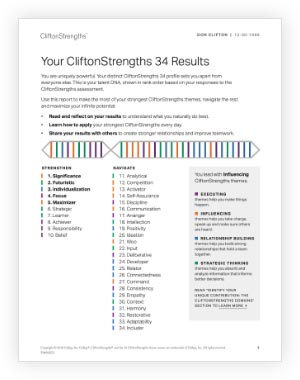Story Highlights
- Consider the five elements of wellbeing needed for a thriving life
- Establish goals focused on your strengths to achieve success
- Use strengths to set realistic health and wellness goals
By mid-February, 80% of the people who set New Year's resolutions will have abandoned them -- no matter how large or small the goal.
But your wellbeing goals shouldn't be forgotten.
Setting health and wellness goals for the new year is a common practice but executing the goals and plans can be much more difficult than initially imagined, particularly when it comes to health targets. Now that you've been striving for a healthier version of yourself for the past month, it's time to reevaluate and realign your goals with a fresh perspective. Consider these different goal-setting examples:
Think about your whole self.
It might be easy to identify a single health habit or outcome you want to target, but consider other areas of your life that also impact your health. Gallup research has identified five elements of wellbeing that are needed to live a thriving life: career, social, financial, physical and community wellbeing are interrelated and interdependent elements of wellbeing.
We are much, much more than what our biometrics say we are.
Infuse multiple elements of wellbeing into your health goals.
For example, if your goal is to improve your sleep routine and get at least seven hours per night, think about what kind of impact that will have -- not just on your physical wellbeing, but other elements as well.
How will this help you personally and professionally? How will executing that habit impact your career pursuits? How will that goal improve your relationships with friends and loved ones? Identifying the answers to these questions gives greater weight to what was initially a simple health quest. Now you're not just focusing on your physical self, you're improving multiple significant elements of your life.
We are much, much more than what our biometrics say we are.
Conversely, establish new health goals by piggybacking on other wellbeing elements. For example, if you strive to increase your 401(k) contributions, identify ways in which a physical health goal could support that. Things like making more meals at home, drinking less alcohol and reducing caloric intake. And budgeting isn't just for your finances. You can apply the same budgeting principles to food, exercise and time spent outside each day.
Why is it important to set realistic goals based on your strengths?
Establish goals and aspirations that jibe with your innate characteristics. Being your best self means playing to your strengths at work and everywhere else. You can better discover your strengths and how to use them to reach your goals with CliftonStrengths 34. People who know and use their CliftonStrengths are more engaged at work, have higher performance in their roles, and are healthier and happier.
Gallup research also tells us that employees who are thriving and engaged are twice as likely to strongly agree there is a leader in their life who makes them enthusiastic about the future when strengths are fully integrated into their work. To help your employees think about their career goals, share with them this list and see which of the descriptions and action items they identify with:
- You thrive on social interaction, so don't go it alone (Relator). Find the right place and the right people to exercise with, cook with or to serve alongside you in community projects.
- On the other hand, some people don't flourish in a gym setting with lots of people present. If you prefer to exercise solo, start a routine at home instead.
- You like numbers and metrics, so try charting and tracking outputs like steps, body fat percentage or heart rate (Analytical).
- But if you're not a numbers person, that's OK. You don't have to force metrics into your health goals. The key factor is figuring out what uniquely motivates you -- then staying focused.
- You're a natural planner (Strategic), so start blocking time off in your calendar for physical activity.
- But if you prefer to have a flexible schedule, you can reinforce your ambitions in other ways. For example, if you're highly social (Woo), share your goals with a close friend for some accountability (Responsibility). Or if you're an achievement-oriented list-maker (Achiever), write down some "to-do's."
- You're a naturally competitive person (Competition), so find ways to compare your performance with others' using rankings and leaderboards (even if it's just in your head).
- But if comparing yourself to others doesn't light you up, you might be better off tracking your individual achievements and then striving to surpass your own previous benchmarks (Maximizer).
- You tend to pay close attention to details and processes (Discipline), so set weekly goals and journal about your gains every day -- no matter how large or small they might be.
- On the other hand, if you're more of a "big picture" person who always looks at long term goals on a far horizon (Futuristic), then set specific, outcome-focused goals to keep your eyes on the prize (Focus).
Use smart goal setting to stay on track.
You're most successful mastering one thing at a time. Don't succumb to the pressure of the health and wellness industry to start lifting weights and eating right and doing cardio and getting 7+ hours of sleep in one big simultaneous push. Start with one initiative … then master it, then move onto the next. Tackle them one at a time.
On the other hand, if you tend to be inspired by grand, ambitious, all-or-nothing endeavors, just go for it. Challenge yourself to do it all (but remember to be realistic with your targets).
When you're establishing goals this time around, focus on the total picture of your wellbeing, and go all-in with habits and routines that play to your strengths -- the unique, individual, and powerful ways that you naturally think, feel, and behave.
Discover how to improve your wellbeing and enjoy a life well-lived with these Gallup offerings:
- Read our findings on the five universal elements of wellbeing based on studies of people in more than 150 countries.
- Learn how CliftonStrengths can improve your career by watching this video.
- Get strategies and solutions to help others understand how to apply their CliftonStrengths to improve performance.




